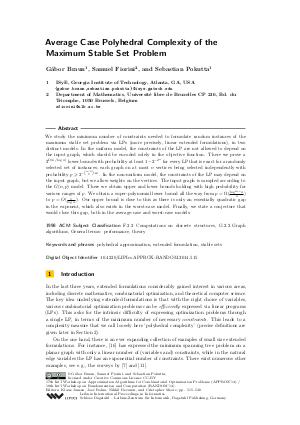Average Case Polyhedral Complexity of the Maximum Stable Set Problem
Authors Gábor Braun, Samuel Fiorini, Sebastian Pokutta
-
Part of:
Volume:
Approximation, Randomization, and Combinatorial Optimization. Algorithms and Techniques (APPROX/RANDOM 2014)
Part of: Series: Leibniz International Proceedings in Informatics (LIPIcs)
Part of: Conference: International Conference on Randomization and Computation (RANDOM)
Part of: Conference: International Conference on Approximation Algorithms for Combinatorial Optimization Problems (APPROX) - License:
 Creative Commons Attribution 3.0 Unported license
Creative Commons Attribution 3.0 Unported license
- Publication Date: 2014-09-04
File

PDF
LIPIcs.APPROX-RANDOM.2014.515.pdf
- Filesize: 0.54 MB
- 16 pages
Document Identifiers
Subject Classification
Keywords
- polyhedral approximation
- extended formulation
- stable sets
Metrics
- Access Statistics
-
Total Accesses (updated on a weekly basis)
0PDF Downloads0Metadata Views
Abstract
We study the minimum number of constraints needed to formulate random instances of the maximum stable set problem via LPs (more precisely, linear extended formulations), in two distinct models. In the uniform model, the constraints of the LP are not allowed to depend on the input graph, which should be encoded solely in the objective function. There we prove a super-polynomial lower bound with overwhelming probability for every LP that is exact for a randomly selected set of instances with a natural distribution. In the non-uniform model, the constraints of the LP may depend on the input graph, but we allow weights on the vertices. The input graph is sampled according to the Erdös-Renyi model. There we obtain upper and lower bounds holding with high probability for various ranges of p. We obtain a super-polynomial lower bound all the way from essentially p = polylog(n) / n to p = 1 / log n. Our upper bound is close as there is only an essentially quadratic gap in the exponent, which also exists in the worst case model. Finally, we state a conjecture to close the gap both in the average-case and worst-case models.
Cite As Get BibTex
Gábor Braun, Samuel Fiorini, and Sebastian Pokutta. Average Case Polyhedral Complexity of the Maximum Stable Set Problem. In Approximation, Randomization, and Combinatorial Optimization. Algorithms and Techniques (APPROX/RANDOM 2014). Leibniz International Proceedings in Informatics (LIPIcs), Volume 28, pp. 515-530, Schloss Dagstuhl – Leibniz-Zentrum für Informatik (2014)
https://doi.org/10.4230/LIPIcs.APPROX-RANDOM.2014.515
BibTex
@InProceedings{braun_et_al:LIPIcs.APPROX-RANDOM.2014.515,
author = {Braun, G\'{a}bor and Fiorini, Samuel and Pokutta, Sebastian},
title = {{Average Case Polyhedral Complexity of the Maximum Stable Set Problem}},
booktitle = {Approximation, Randomization, and Combinatorial Optimization. Algorithms and Techniques (APPROX/RANDOM 2014)},
pages = {515--530},
series = {Leibniz International Proceedings in Informatics (LIPIcs)},
ISBN = {978-3-939897-74-3},
ISSN = {1868-8969},
year = {2014},
volume = {28},
editor = {Jansen, Klaus and Rolim, Jos\'{e} and Devanur, Nikhil R. and Moore, Cristopher},
publisher = {Schloss Dagstuhl -- Leibniz-Zentrum f{\"u}r Informatik},
address = {Dagstuhl, Germany},
URL = {https://drops.dagstuhl.de/entities/document/10.4230/LIPIcs.APPROX-RANDOM.2014.515},
URN = {urn:nbn:de:0030-drops-47201},
doi = {10.4230/LIPIcs.APPROX-RANDOM.2014.515},
annote = {Keywords: polyhedral approximation, extended formulation, stable sets}
}
Author Details
References
-
D. Avis and H. R. Tiwary. On the extension complexity of combinatorial polytopes. ArXiv e-prints, February 2013.

-
G. Braun, S. Fiorini, S. Pokutta, and D. Steurer. Approximation Limits of Linear Programs (Beyond Hierarchies). In 53rd IEEE Symp. on Foundations of Computer Science (FOCS 2012), pages 480-489, 2012.

- G. Braun and S. Pokutta. Common information and unique disjointness. In IEEE 54th Annual Symp. on Foundations of Computer Science (FOCS 2013), pages 688-697, 2013. URL: http://eccc.hpi-web.de/report/2013/056/.
- G. Braun and S. Pokutta. The matching polytope does not admit fully-polynomial size relaxation schemes. preprint available at http://arxiv.org/abs/1403.6710, 2014.
-
M. Braverman and A. Moitra. An information complexity approach to extended formulations. In Proceedings of the 45th annual ACM symposium on Theory of computing, pages 161-170, 2013.

-
S. O. Chan, J. R. Lee, P. Raghavendra, and D. Steurer. Approximate constraint satisfaction requires large LP relaxations. In IEEE 54th Annual Symp. on Foundations of Computer Science (FOCS 2013), pages 350-359, 2013.

-
M. Conforti, G. Cornuéjols, and G. Zambelli. Extended formulations in combinatorial optimization. 4OR, 8:1-48, 2010.

-
R. Diestel. Graph Theory. Springer-Verlag Heidelberg, New York, 2005.

-
S. Fiorini, S. Massar, S. Pokutta, H. R. Tiwary, and R. de Wolf. Linear vs. Semidefinite Extended Formulations: Exponential Separation and Strong Lower Bounds. Proc. STOC 2012, 2012.

-
M. X. Goemans and D. P. Williamson. Improved approximation algorithms for maximum cut and satisfiability problems using semidefinite programming. J. Assoc. Comput. Mach., 42:1115-1145, 1995.

-
V. Kaibel. Extended formulations in combinatorial optimization. Optima, 85:2-7, 2011.

-
V. Kaibel and S. Weltge. A Short Proof that the Extension Complexity of the Correlation Polytope Grows Exponentially. ArXiv e-prints, July 2013.

-
S. Pokutta and M. Van Vyve. A note on the extension complexity of the knapsack polytope. Operations Research Letters, 41:347-350, 2013.

-
T. Rothvoß. Some 0/1 polytopes need exponential size extended formulations, 2011. arXiv:1105.0036.

-
Thomas Rothvoß. The matching polytope has exponential extension complexity. ArXiv e-prints, 2013.

-
J. C. Williams. A linear-size zero-one programming model for the minimum spanning tree problem in planar graphs. Networks, 39:53-60, 2002.

